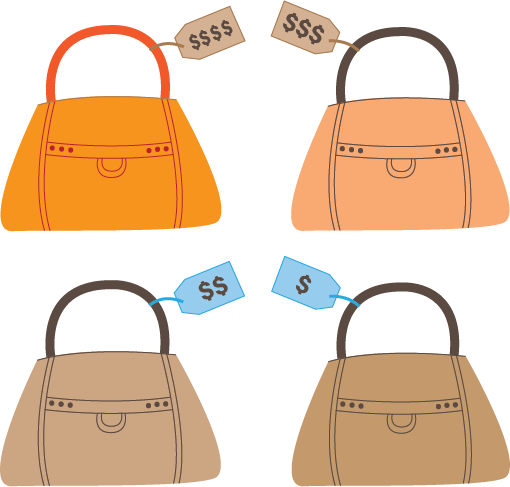Budget buyers don’t deserve the brutal criticism

photo by Caitlyn Hale
Although name brand items tend to have higher quality than off brand items, many choose to sacrifice quality to save money and accommodate for their financial situations.
For avid spenders, finding the funds for choice products is always a challenge, and buying off-brand items is a popular way to save. Fast-fashion brands like SHEIN and Romwe continue to enjoy sky-high profit margins by selling cheap remakes.
Why, then, are people faced with silent scrutiny when a peer notices that their duped Birkenstocks are not actually name-brand? Why do green text bubbles bother countless Apple users? And why can name brand items manage to escape any sort of judgement?
Whether or not a product is on-brand does not have to determine their value. Although lacking in authenticity, companies that sell duped items serve as opportunities to save money while preserving quality. For example, clothing brand House of Sunny’s “hockey dress” was priced at $127 but cheaper versions of the item can be found on sites such as EMMIOL and SHEIN. Although they are priced up to $90 cheaper than the original dress, the dupes are almost indistinguishable from the authentic product. The only real difference between high fashion and fast fashion products is that high-end brands like House of Sunny tend to use high-quality cotton while other brands use spandex or polyester substitutes.
However, increasing demands for ethical production has raised the question of whether or not these low prices are worth their toll on production employees. Although this movement was meant to target the fashion brands themselves, their customers often receive the criticism, but on a completely different premise. Scrutinizers will often excuse their holier-than-thou attitude by hiding behind their “concern” for ethicality, but in reality, they are merely seeking to showcase their entitlement. Righteously judging the financial decisions of those who cannot afford to pay double for stylish clothing is not ethical in the slightest. It only serves to protect one’s own social status, one that equates popularity to wealth.
Although Airpods are widely used among Apple users, Raycon earbuds are close competitors in terms of quality, regardless of their $60 price difference. This gigantic discount should be seen as an opportunity to save, not as a flaw in someone’s class or style.
Ridiculous as it may seem, whether or not someone receives financial scrutiny can even be based upon which coffee chain they frequent. Spending $4 on a prestigious Starbucks latte is less likely to set off the same reaction as picking up a 99¢ McDonald’s premium roast. In cases like these, scrutiny boils down to whichever logo ends up on your cup. How superficial does judgement have to be before its morality is questioned? How long will money and spending be the sole determiners of status?
When name brand bias reaches social media, it not only spreads misinformation about name brands, but it also further divides those who can and cannot afford popular products. This has reached to such an extent that it has become commonplace to mock or tease Android users. On Tik Tok, this kind of scrutiny becomes heightened because the app only accommodates iPhone cameras. For example, one Tik Tok mocks Android camera quality while another goes as far as to sarcastically call Android users “social rejects”. Criticizing inherently inexpensive brands purely because of their “low” quality only reveals someone’s economic privilege. It is easy to say that “androids suck” or that everyone should “just get an iPhone” when they have ample money to spare. Not everyone can afford to spend $900 for the sake of owning a popular phone, and it is not anyone’s place to be providing commentary on someone’s financial situation.
The prospect of judging a classmate because of what pencils they own, or even the color of their socks is inching ever closer to reality. Whether an off brand product is a mirror image of the original or hardly comparable, criticizing it inherently criticizes the buyer. Prioritizing savings over brand names should not condemn someone to insecurity and embarrassment.
Your donation will support the student journalists of Hagerty High School. Your contribution helps us publish six issues of the BluePrint and cover our annual website hosting costs. Thank you so much!






